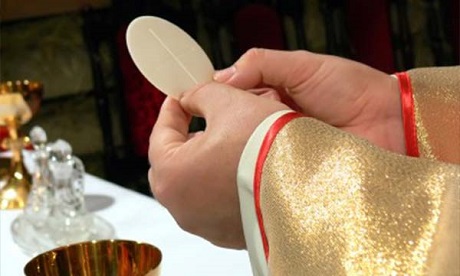A letter to the German bishops from the Congregation for the Doctrine of the Faith says Pope Francis has asked the German Catholic bishops’ conference not to publish nationwide guidelines for allowing Protestants married to Catholics to receive Communion at Mass.
The letter signed by Congregation’s prefect, Cardinal-designate Luis Ladaria, says Pope Francis has concluded that their statement “has not matured enough to be published.”
Instead, it suggested, the bishops should continue the practice of judging specific situations.
Early last month he hosted a meeting with a group of German bishops.
Those present included supporters and opponents of the document.
Officials from the Pontifical Council for Promoting Christian Unity and the Pontifical Council for Legislative Texts also attended the meeting.
A Vatican statement was issued at the end of the meeting.
It said:”Pope Francis appreciates the ecumenical commitment of the German bishops and asks them to find, in a spirit of ecclesial communion, a result as unanimously as possible.”
Ladaria’s letter, which was published on an Italian blog “Settimo Cielo,” lists three main issues:
- The question of the admission to Communion of Lutheran Christians in interconfessional marriages is a theme that touches on the faith of the Church and has relevance for the universal Church.”
- “Such a question has effects on ecumenical relations with other churches and other ecclesial communities that cannot be undervalued.”
- The matter also involves Church law, particularly the interpretation of canon 844 of the Code of Canon Law.
The text of the German guidelines has never been made public.
However, it has been widely assumed to foresee situations where a Lutheran married to a Catholic and regularly attending Mass with the Catholic spouse, could receive the Eucharist on a regular basis.
In many countries, bishops allow this on special occasions, such as to a parent during their child’s baptism or first Communion.
Ladaria’s letter said because of varying interpretations of the canon, “the competent dicasteries of the Holy See already have been charged with producing a timely clarification of such questions on the level of the universal Church.
“In particular,” he said, “it appears opportune to leave to the diocesan bishop the judgment about the existence of a ‘grave necessity’” that would permit Christians of other denominations to receive the Eucharist at a Catholic Mass.
Source
